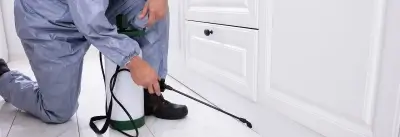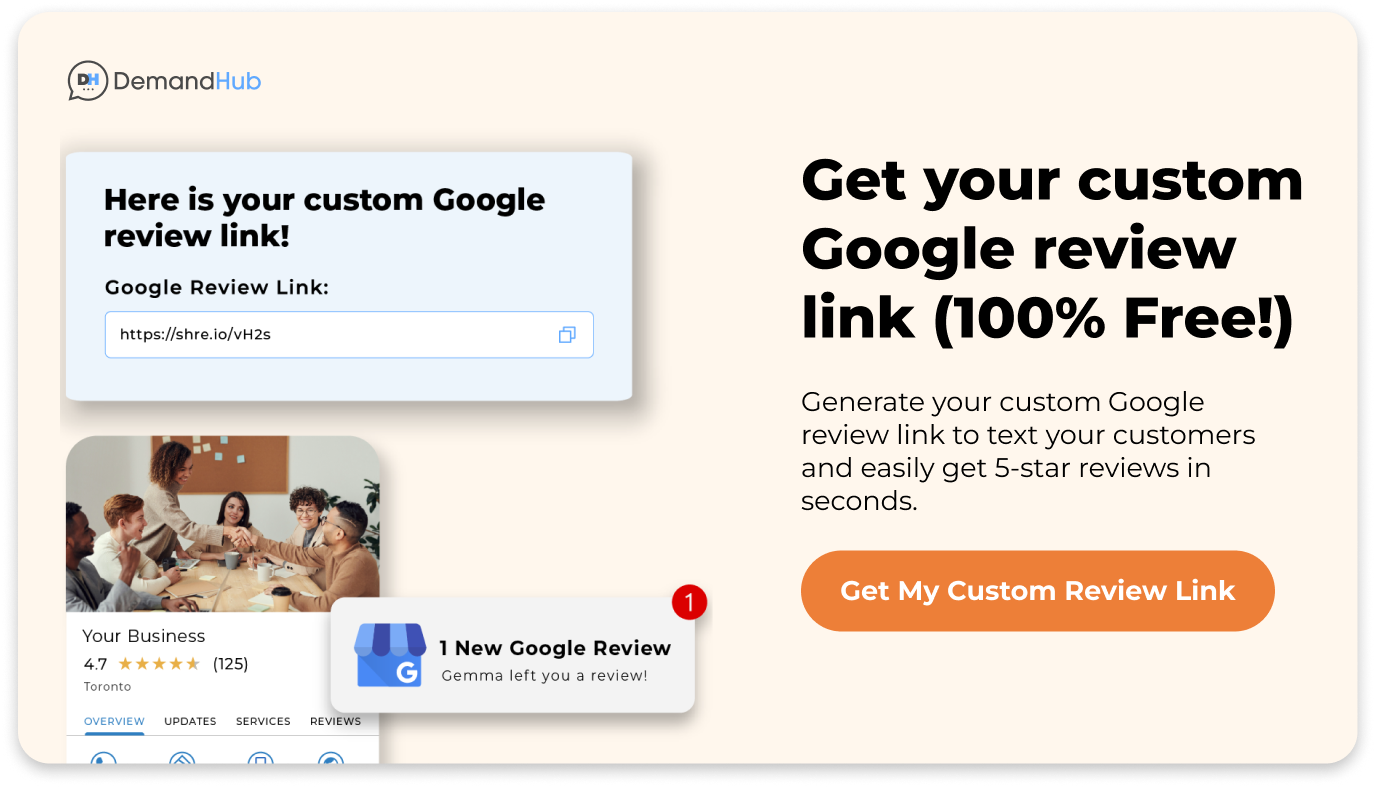14 Effective Pest Control Marketing Strategies To Boost Your Business

In the pest control industry, standing out is as crucial as your services. Amidst a sea of competitors, how do you ensure your business doesn’t just blend into the background?
Without a standout marketing strategy, even top-notch pest control services can go unnoticed, leading to stagnant growth and missed opportunities.
This guide is your key to unlocking the potential of pest control marketing. We’ll introduce you to 14 innovative strategies tailored to elevate your business in an industry that’s thriving and expanding.
Pest control is a future-proofed sector, growing alongside the human population and its diverse pest challenges. From rodent control to termite extermination, there’s a niche for every entrepreneur.
Let’s dive in and explore how you can capitalize on these opportunities to make your mark.
Table of Contents- How to Create a Pest Control Business Marketing Plan?
- 14 Pest Control Marketing Ideas & Strategies to Generate New Leads
- Win More Customers with DemandHub
- Frequently Asked Questions (FAQs) about Pest Control Marketing
How to Create a Pest Control Business Marketing Plan?
Creating a marketing plan for your pest control business is a strategic process that involves understanding your market, setting clear goals, and outlining the steps to achieve them.
Here’s a step-by-step guide to help you craft an effective marketing plan:
1. Define Your Business Goals
Start by setting clear, measurable objectives. Whether it’s increasing your customer base, boosting brand awareness, or enhancing your online presence, your goals should be specific, achievable, and time-bound.
2. Identify Your Target Audience
Understand who your customers are. Are they homeowners, businesses, or both? Knowing your audience helps tailor your marketing efforts to their specific needs and preferences.
3. Analyze Your Competition
Research your competitors to understand their strengths and weaknesses. This insight will help you differentiate your services and find your unique selling proposition (USP).
4. Choose Your Marketing Channels
Decide on the most effective channels to reach your audience. This could include online platforms like social media and SEO and traditional methods like local advertising and direct mail.
5. Develop Your Messaging
Craft compelling messages highlighting the benefits of your services. Your messaging should address the specific problems your target audience faces and how your services provide solutions.
6. Set a Budget
Determine how much you can afford to spend on your marketing efforts. Allocate your budget across different channels based on their effectiveness and your business goals.
7. Plan Your Marketing Activities
Outline the specific actions you’ll take. This could include creating a content calendar for social media, scheduling email campaigns, or planning community engagement events.
8. Implement and Monitor
Launch your marketing activities and closely monitor their performance. Use tools like Google Analytics for online campaigns and customer reviews for offline efforts.
9. Evaluate and Adjust
Regularly review the results of your marketing efforts against your goals. Be prepared to adjust your strategies based on what’s working and what’s not. Continuous evaluation and flexibility are key to refining your marketing plan for better results.
10. Stay Informed and Adapt
The pest control market and marketing trends are always evolving. Keep yourself informed about industry changes and be ready to adapt your marketing plan accordingly.
Following these steps, you’ll create a focused and effective marketing plan to help steer your pest control business toward greater visibility, customer engagement, and growth.
14 Pest Control Marketing Ideas & Strategies to Generate New Leads
In the competitive pest control industry, attracting new customers is key to growth. Here are 14 innovative marketing strategies to help you expand your reach and generate new leads.
1. Understanding Your Target Audience
Effective marketing starts with a deep understanding of your target audience. Conduct thorough market research to grasp your potential customers’ demographics, behaviors, and preferences.
Identify their specific pain points, whether it’s health concerns, property damage, or other pest-related issues.
Segment your audience for more targeted marketing, and create detailed buyer personas to guide your messaging. Stay attuned to customer feedback and industry trends to keep your strategies relevant and effective.
2. Build a Strong Online Presence
A robust online presence is essential in today’s digital age. Start by optimizing your website for user-friendliness and mobile responsiveness. Implement SEO strategies to improve visibility in search engine results, using relevant keywords and local terms.
Engage with customers on social media platforms where they are most active, sharing content that showcases your services and success stories. Claim and optimize your Google Business Profile listing to enhance local search visibility.
Consider investing in targeted online advertising, such as pay-per-click campaigns, to reach potential customers actively searching for pest control services.
Additionally, engage in content marketing by creating informative blog posts, infographics, and videos that address common pest issues. Lastly, use email marketing to send your audience personalized newsletters, special offers, and updates.
3. Be Active on Social Media
Social media is a powerful tool for connecting with potential customers and building your brand. Being active on platforms like Facebook, Instagram, and LinkedIn helps you engage directly with your audience.
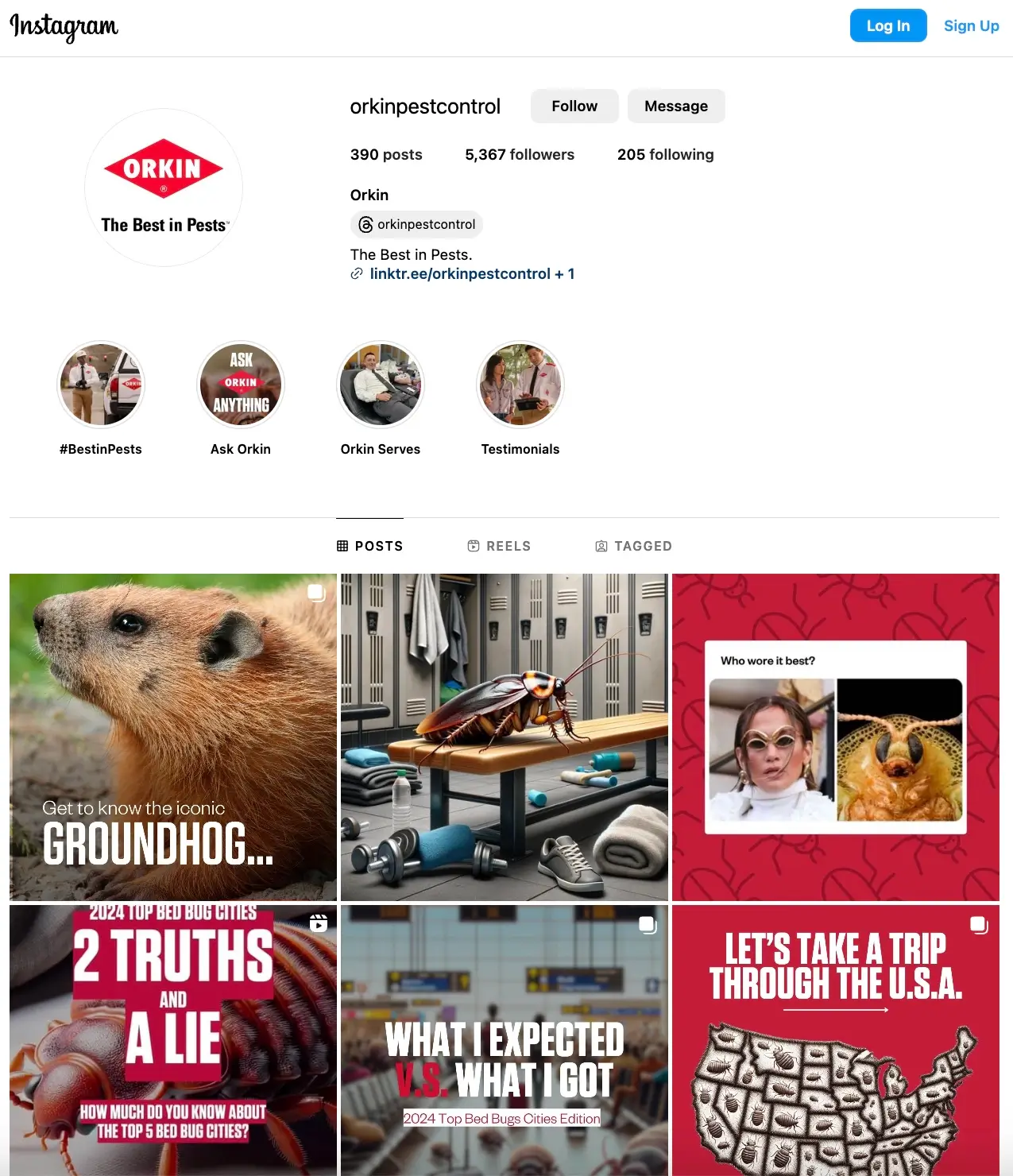
Share content that is both informative and engaging, such as tips for pest prevention, behind-the-scenes looks at your services, and customer testimonials. Regular posts and interactions increase your visibility and help establish your business as approachable and knowledgeable in the field of pest control.
Use social media advertising to target specific demographics and geographic areas, enhancing the reach and effectiveness of your campaigns.
Consistency is key – maintain a regular posting schedule and promptly respond to comments and inquiries to build trust and rapport with your audience.
4. SEO-Optimize Your Website
A well-optimized website is crucial for attracting more organic traffic and improving your online visibility. Start by ensuring your website is fast, mobile-friendly, and easy to navigate. Use relevant keywords throughout your site, including in titles, headings, and content, to improve your search engine rankings.
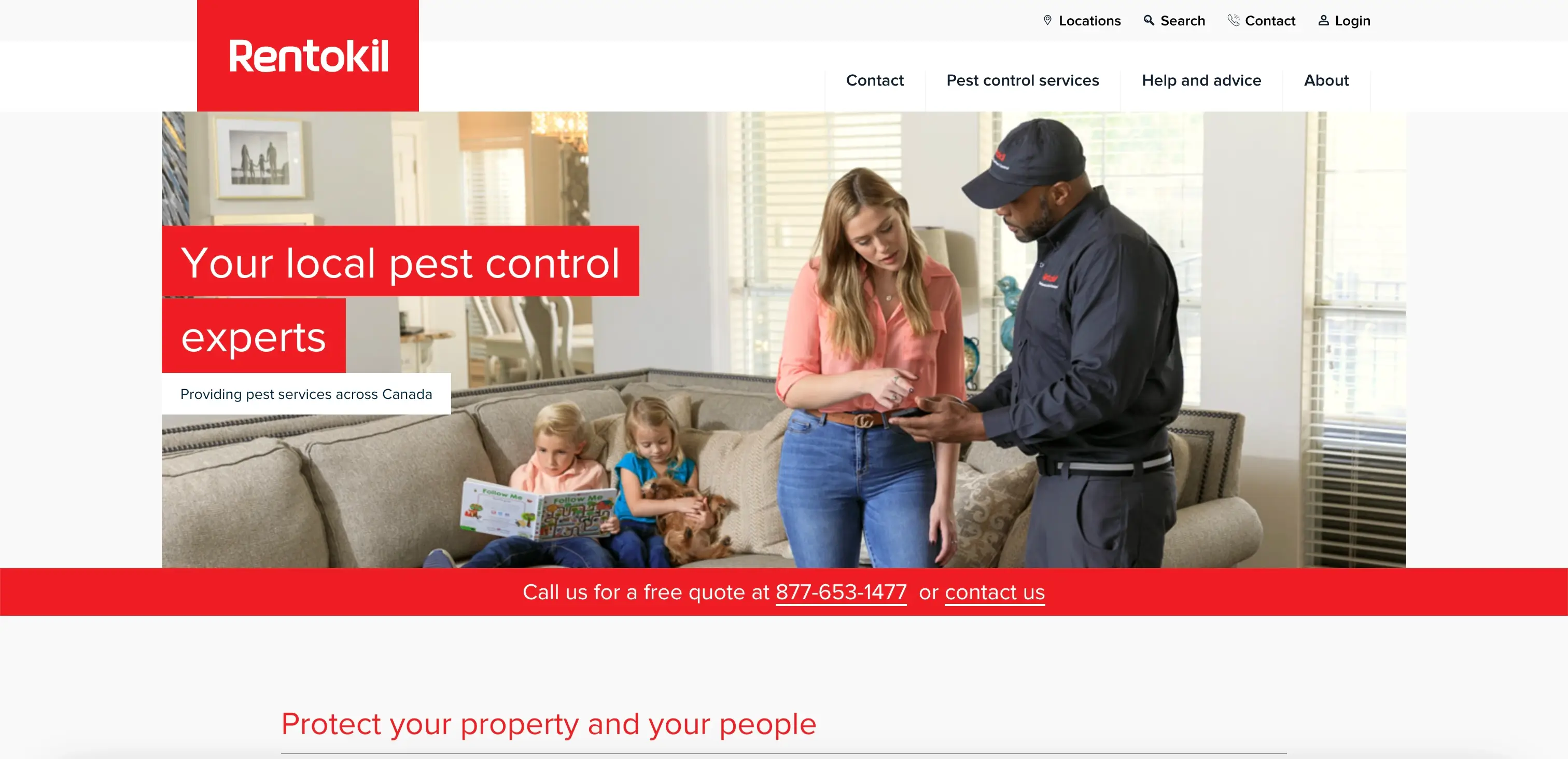
These keywords should reflect your services and be specific to the pest control industry, such as “termite inspections” or “eco-friendly pest control.”
Incorporate local SEO practices by including location-based keywords, which are essential for attracting customers in your service area. Regularly update your website with fresh content, such as blog posts and customer success stories, to keep it relevant and engaging.
Also, ensure your website has clear calls-to-action (CTAs) and easy-to-find contact information to encourage potential customers to reach out.
5. Optimize Your Google Business Profile
Your Google Business Profile is a critical tool for local SEO and helps potential customers find your pest control services. Ensure your profile is complete and up-to-date, with accurate business information, including your address, phone number, and hours of operation.
Add a detailed description of your services and any unique selling points that set you apart from competitors. Regularly upload high-quality photos of your team, equipment, and completed jobs to give potential customers a better understanding of your services.
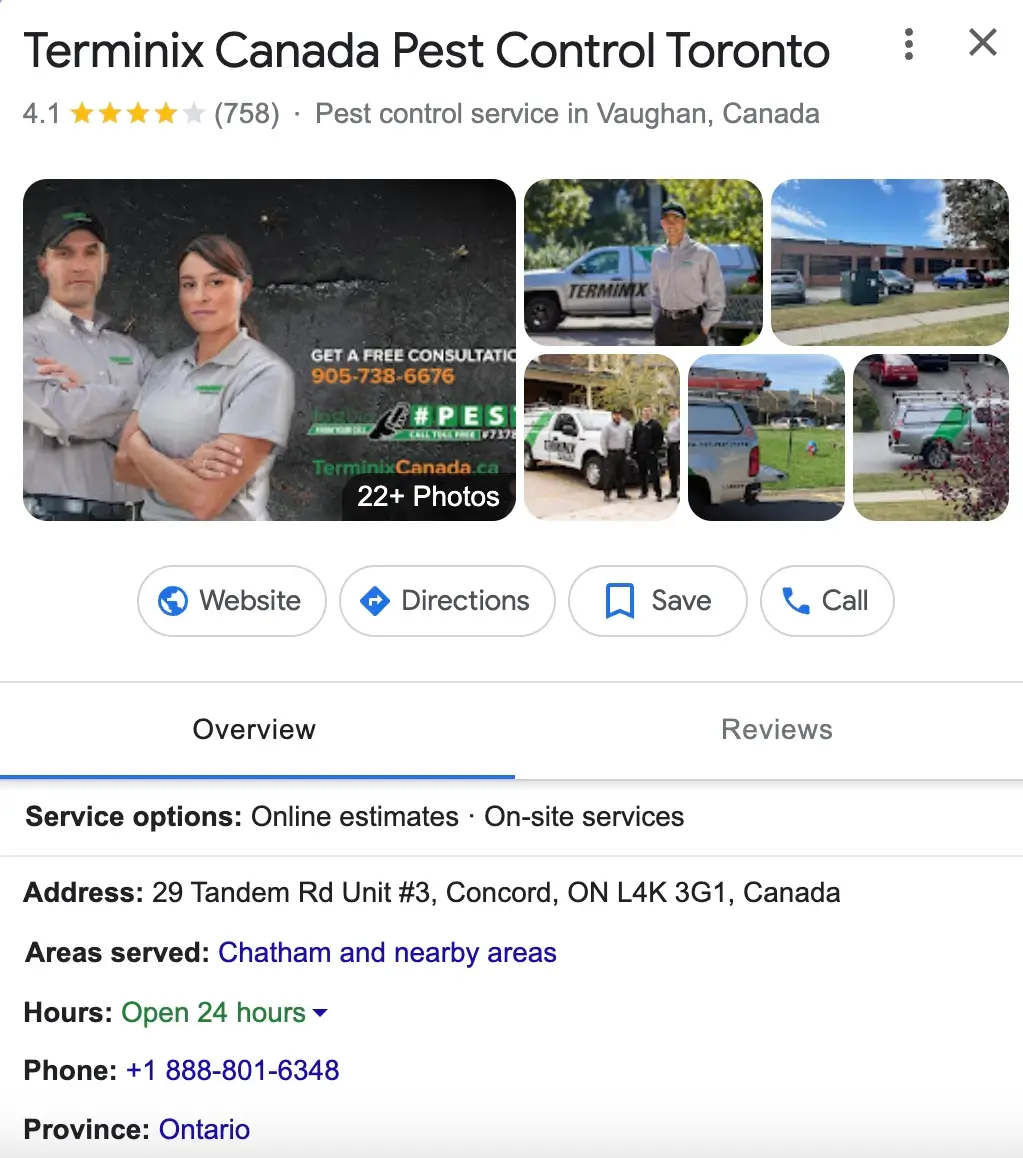
Encourage satisfied customers to leave reviews on your profile, as positive reviews can significantly influence potential clients’ decisions. Respond to all positive and negative reviews to show that you value customer feedback and are committed to providing excellent service.
Lastly, use the posts feature to share updates, offers, and news about your business, keeping your profile active and engaging for users.
6. Collect Online Customer Reviews
Online customer reviews are a powerful tool for building trust and credibility. Encourage your satisfied customers to leave reviews on platforms like Google, Yelp, and Facebook. Make it easy for them by sending follow-up emails or texts with direct links to your review pages.
Highlight positive reviews on your website and social media channels. Respond to all reviews, thanking customers for their feedback and addressing any concerns raised in less favorable reviews.
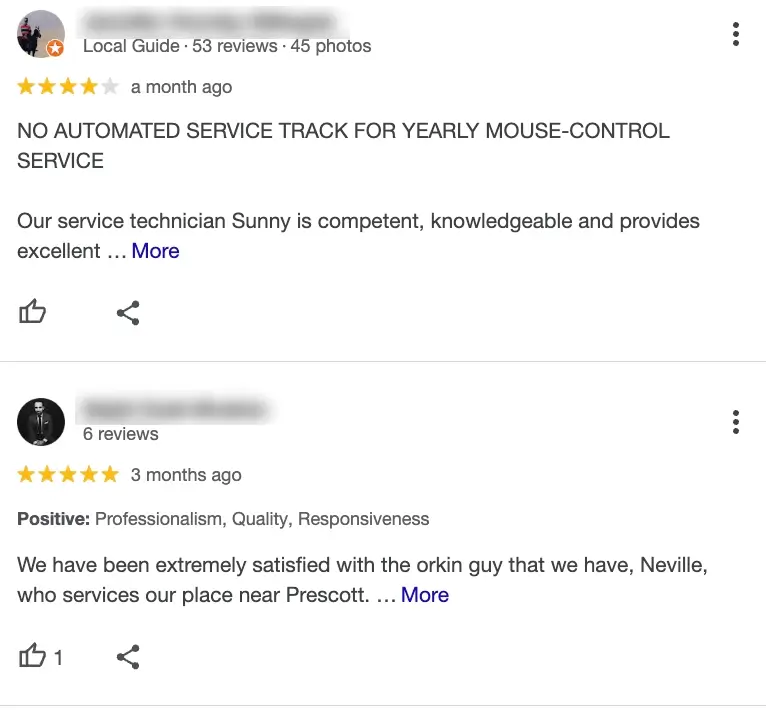
This shows that you value customer input and are committed to excellent service. Regularly monitoring and collecting customer reviews can significantly enhance your business’s online presence and appeal to potential clients.
7. Manage Your Online Reputation
Your online reputation is a key factor in attracting new business. Actively monitor what is being said about your company on social media, review sites, and online forums. Use tools like Google Alerts to stay informed about mentions of your business.
Address negative feedback promptly and professionally, offering solutions to any issues raised. This proactive approach to reputation management can turn potentially damaging situations into opportunities to demonstrate customer service excellence.
Additionally, share positive customer experiences and testimonials on your digital platforms to reinforce your reputation as a reliable and customer-focused pest control service.
8. Do Content Marketing for Pest Control
Content marketing is an effective way to engage with your audience and establish your expertise in the pest control industry.
Create and share valuable content that addresses common pest issues, prevention tips, and the benefits of professional pest control services. This can include blog posts, how-to guides, infographics, and videos.
Tailor your content to answer the questions and concerns of your target audience. Consistently produce high-quality, informative content to improve your SEO and attract more traffic to your website. It will position your brand as a knowledgeable leader in the pest control field.
Remember to promote your content across your social media channels and email newsletters to maximize its reach and impact.
9. Use Online Advertising
Online advertising offers a targeted approach to reaching potential customers. Use platforms like Google Ads and social media advertising to place your services in front of people actively searching for pest control solutions.
Segment your audience based on demographics, location, and interests for more effective targeting. Use compelling ad copy and visuals to grab attention and encourage clicks.
Consider retargeting ads to re-engage visitors who have previously interacted with your website but haven’t converted. Track the performance of your ads using analytics tools to understand their effectiveness and make data-driven adjustments to your campaigns. Investing in online advertising can significantly boost your visibility and lead-generation efforts.
10. Use Offline Advertising
While digital marketing is crucial, don’t overlook the power of offline advertising. Traditional methods like local newspaper ads, radio spots, and billboards can effectively reach segments of your audience who may not be as active online.
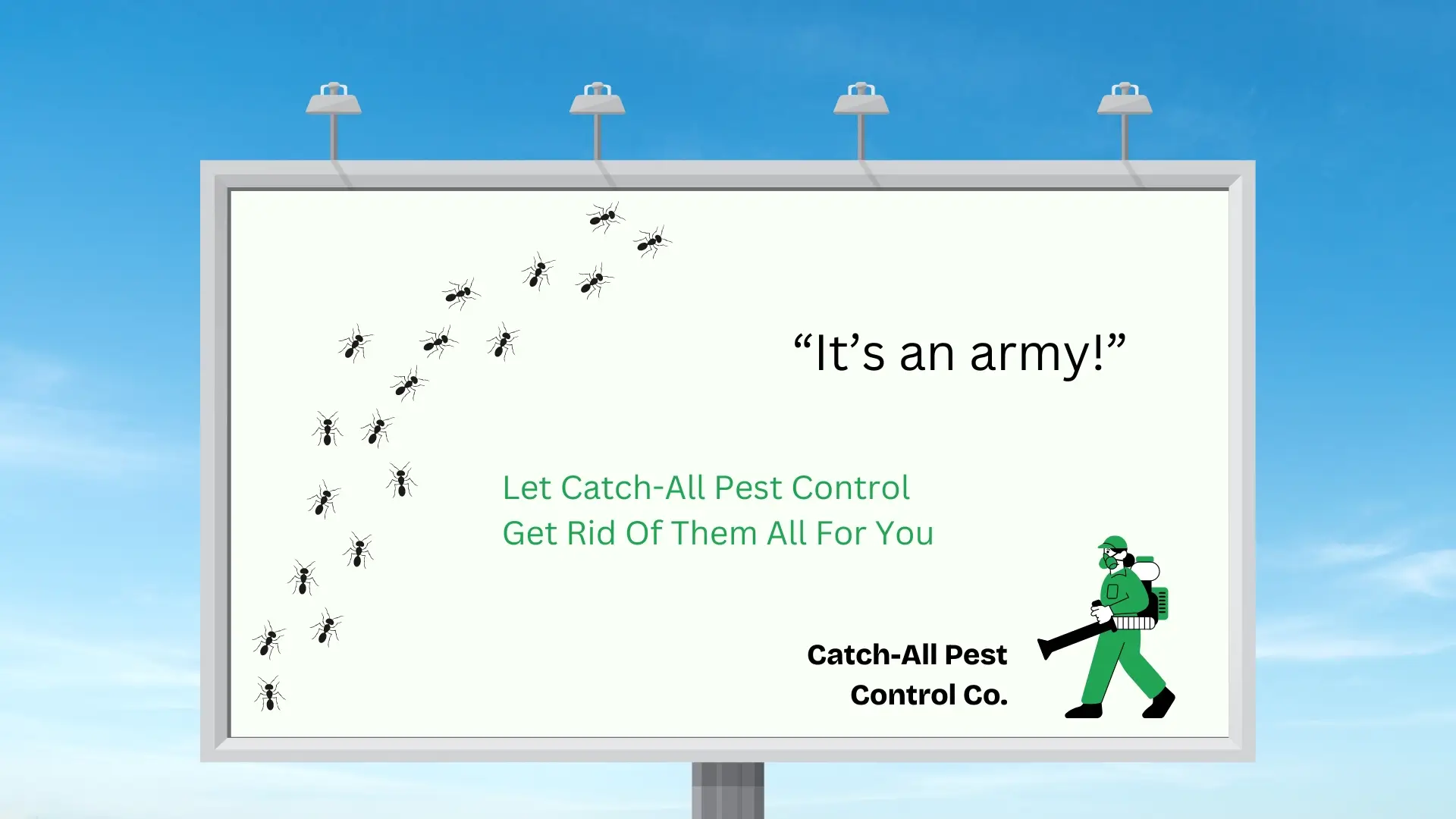
Participate in local community events or sponsor local sports teams to increase brand visibility. Vehicle wraps and signage on your service vehicles can also serve as moving billboards, promoting your pest control business wherever you go. These offline strategies complement your online efforts, creating a comprehensive marketing approach that covers all bases.
11. Create and Distribute Marketing Materials
Develop professional marketing materials such as brochures, flyers, and business cards. Ensure these materials clearly outline your services, special offers, and contact information. Distribute them to local businesses, community centers, and local events. You can also mail them directly to potential customers in targeted neighborhoods. Make sure your branding is consistent across all materials to enhance brand recognition and recall.
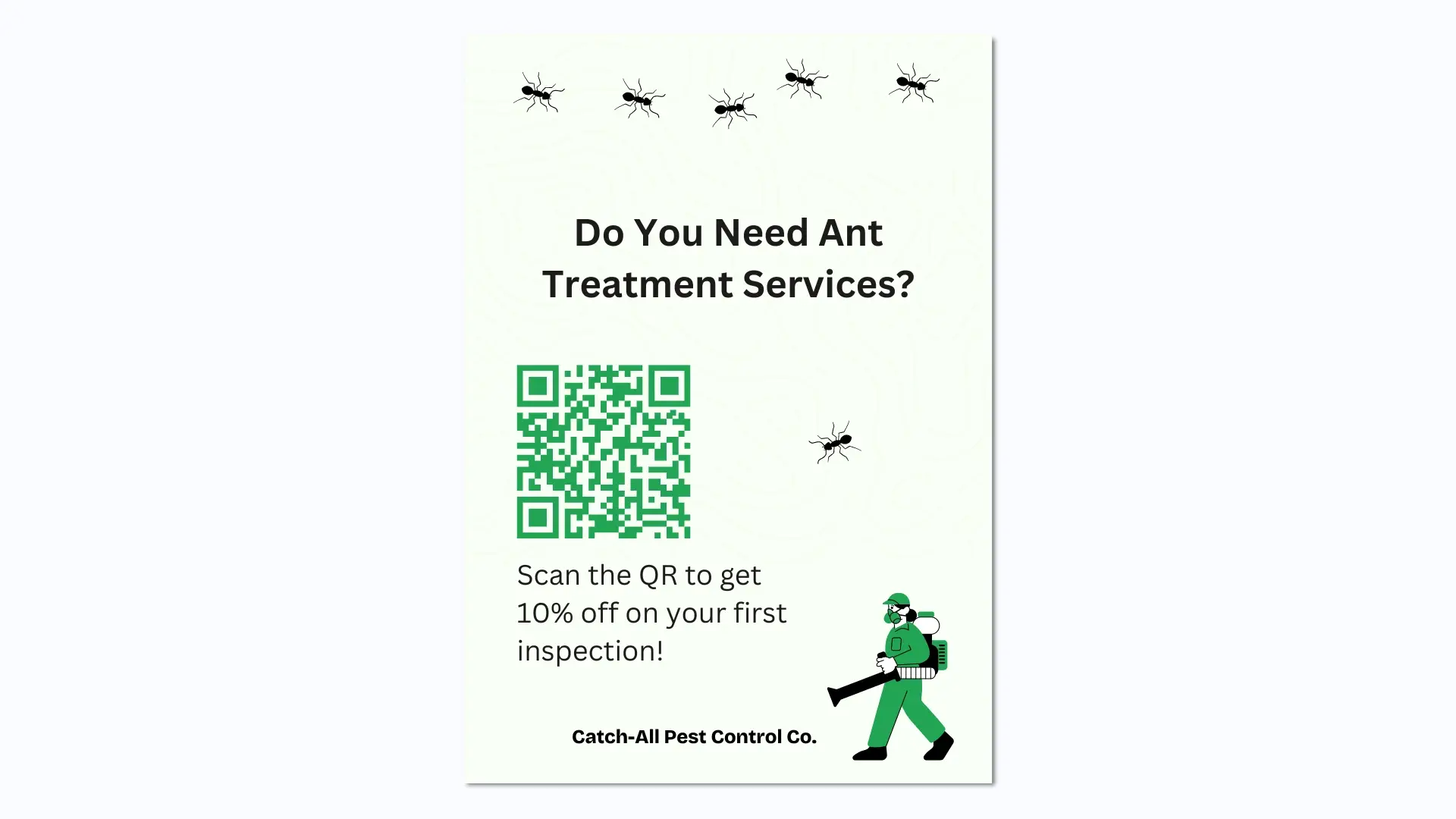
12. Build a Reward Program
A reward program, often called a loyalty program, is a marketing strategy designed to encourage repeat business and deepen customer loyalty. It involves offering incentives to customers who frequently use your services or products.
The main goal is to reward and acknowledge repeat customers, making them feel valued and encouraging them to continue choosing your business over competitors.
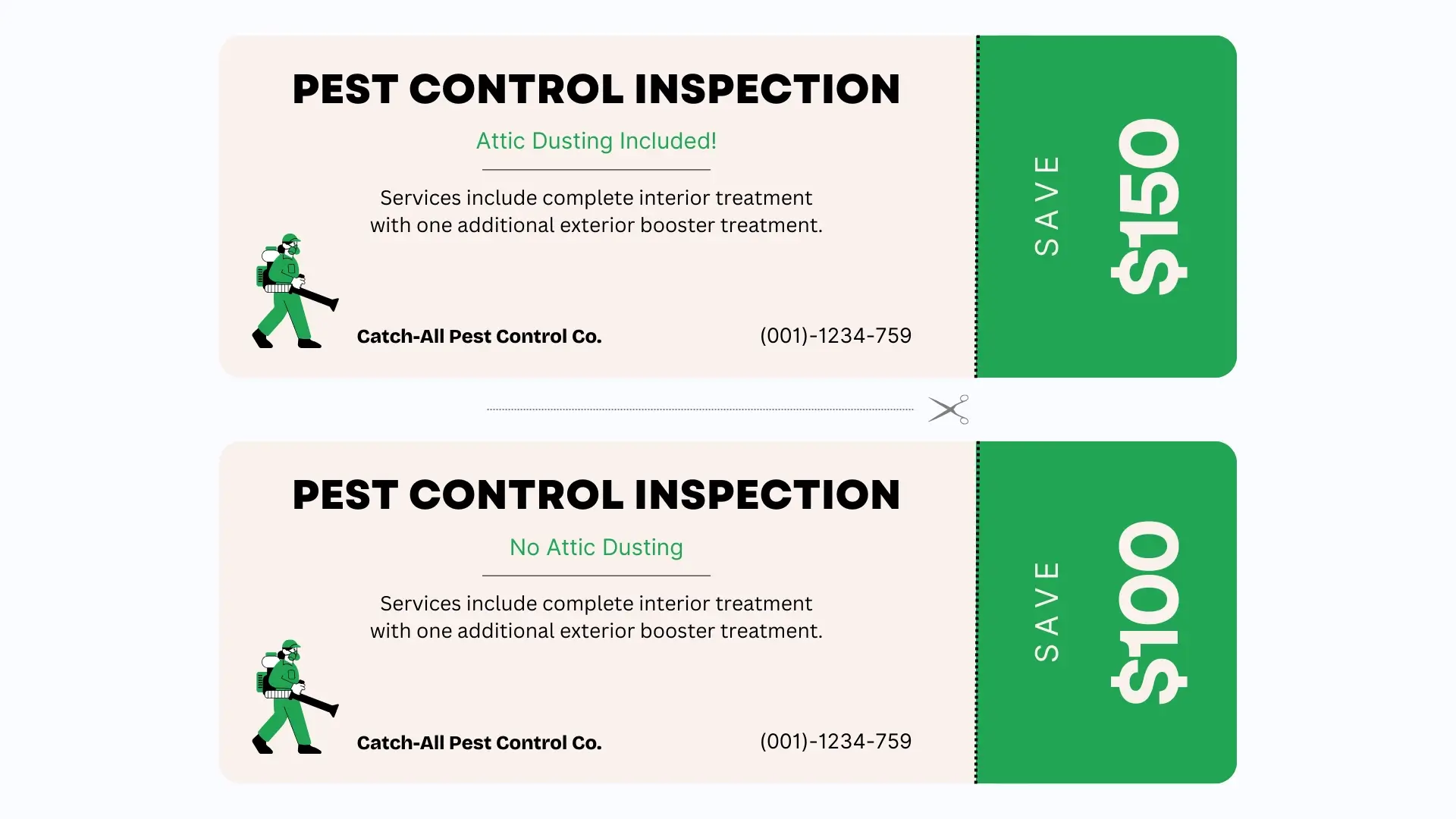
Implement a reward program for your pest control business. Offer incentives like discounts, free services, or exclusive offers to returning customers. You can also introduce a loyalty points system where customers accumulate points with each service, which they can redeem for rewards.
Here are some key elements of a reward program:
Points System
Customers earn points for each purchase or service they use. These points can then be accumulated and redeemed for discounts, free services, or special offers. For example, a pest control company might offer a free service after a certain number of paid services.
Tiered Rewards
As customers reach different levels of spending or frequency of service, they unlock new tiers of rewards. Higher tiers might offer greater discounts or exclusive benefits, motivating customers to continue using your services.
Referral Bonuses
Rewarding customers for referring new clients to your business. For instance, if a customer refers a friend who becomes a client, the referrer and the new client receive a discount on their next service.
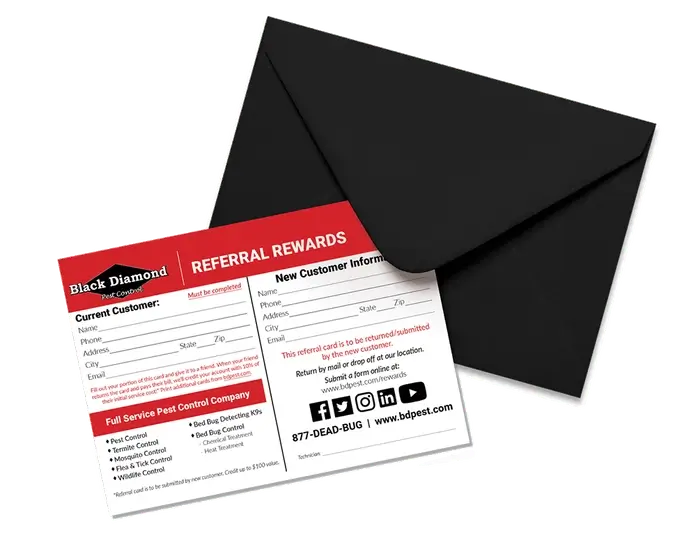
Image source: blackdiamondpestcontrol.com
Membership Benefits
Offering a membership program where customers pay an upfront fee to enjoy benefits such as discounted services, priority scheduling, or exclusive access to new offerings.
Special Occasion Rewards
Providing special offers or discounts on customer birthdays, anniversaries of their first service, or during holiday seasons.
Non-Monetary Perks
Rewards don’t always have to be discounts or freebies. They can also include exclusive access to events, educational content, or early access to new services.
Remember, a well-designed reward program incentivizes repeat business and helps build a strong and loyal customer base.
13. Create an Email List to Retain Customers
Build an email list to maintain direct contact with your customers. Use it to send out updates, newsletters, special offers, and helpful tips related to pest control.
Personalize your emails to make them more engaging and relevant to your audience. Regular communication keeps your business top-of-mind and can encourage repeat business and referrals.
14. Partner up with Local Businesses
Forming partnerships with local businesses can open up new marketing avenues. Collaborate with home improvement stores, real estate agencies, or local hardware stores. You can offer their customers special deals and, in return, get referrals.
Joint marketing efforts like co-hosting events or cross-promotion can be mutually beneficial in reaching wider audiences.
Win More Customers with DemandHub
Effective marketing is essential for attracting new customers. Whether you’re dealing with bed bugs, termites, or ants, leveraging the digital world is crucial for growing your business. The right marketing strategies can significantly improve your search rankings and increase your online visibility, opening the door to new opportunities.
DemandHub is here to simplify this process for pest control businesses of all sizes, from large corporations to small family-run operations. Our intuitive and all-in-one platform offers practical tools and insights to help you manage your online reputation effortlessly.
Discover valuable tips on our blog or explore solutions that are tailored to attract more leads and encourage customer loyalty.
With DemandHub, you’re not just putting your business out there but strategically positioning it to thrive in a competitive digital landscape. Let us help you turn your online marketing efforts into real growth for your pest control business.
Book a Demo or get your free trial today.
Frequently Asked Questions (FAQs) about Pest Control Marketing
How do I advertise my pest control services?
You can advertise your pest control services by using a mix of digital and traditional marketing strategies. For Online, focus on building a solid website, engaging in SEO, and being active on social media.
Consider local newspaper ads, community event sponsorships, and direct mail campaigns for offline strategies. Tailor your advertising messages to address your target audience’s specific needs and concerns.
What is the target market for pest control?
The target market for pest control typically includes homeowners, landlords, and business owners. Within these groups, you can further segment your audience based on factors like property type, location, and specific pest issues they are facing. Understanding these segments helps in creating more targeted and effective marketing campaigns.
How can I improve my pest control business?
Improving your pest control business can be achieved by enhancing service quality, expanding your service offerings, and investing in marketing. Focus on training your staff, adopting new technologies, and maintaining high customer service standards.
In terms of marketing, refine your strategies based on customer feedback and market trends, and always look for new ways to reach and engage with your audience.
How do I get more sales on pest control?
To increase sales in pest control, focus on building strong customer relationships and expanding your reach through effective marketing. Implement referral programs, engage in local community events, and optimize your online presence through SEO and social media marketing.
Additionally, consider offering promotions or discounts to new customers and ensure your sales team is well-trained in both product knowledge and customer service.
